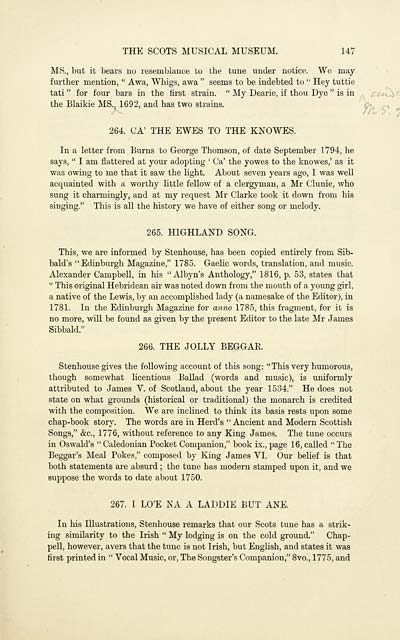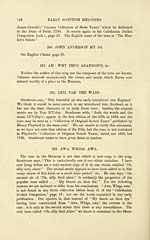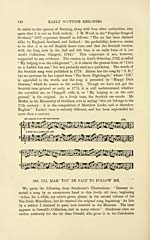Inglis Collection of printed music > Printed text > Early Scottish melodies
(169) Page 147 - Ca' the ewes to the knowes
Download files
Complete book:
Individual page:
Thumbnail gallery: Grid view | List view

THE SCOTS MUSICAL MUSEUM. 147
MS., but it bears no resemblance to the tune under notice. We may
further mention, " Awa, Whigs, awa " seems to be indebted to " Hey tuttie
tati " for four bars in the first strain. " My Dearie, if thou Dye " is in
the Blaikie MS., 1692, and has two strains.
264. CA' THE EWES TO THE KNOWES.
In a letter from Burns to George Thomson, of date September 1794, he
says, " I am flattered at your adopting ' Ca' the yowes to the knowes,' as it
was owing to me that it saw the light. About seven years ago, I was well
acquainted with a worthy little fellow of a clergyman, a Mr Clunie, who
sung it charmingly, and at my request Mr Clarke took it down from his
singing." This is all the history we have of either song or melody.
265. HIGHLAND SONG.
This, we are informed by Stenhouse, has been copied entirely from Sib-
bald's "Edinburgh Magazine," 1785. Gaelic words, translation, and music.
Alexander Campbell, in his " Albyn's Anthology," 1816, p. 53, states that
" This original Hebridean air was noted down from the mouth of a young girl,
a native of the Lewis, by an accomplished lady (a namesake of the Editor), in
1781. In the Edinburgh Magazine for anno 1785, this fragment, for it is
no more, will be found as given by the present Editor to the late Mr James
Sibbald."
266. THE JOLLY BEGGAR
Stenhouse gives the following account of this song: "This very humorous,
though somewhat licentious Ballad (words and music), is uniformly
attributed to James V. of Scotland, about the year 1534." He does not
state on what grounds (historical or traditional) the monarch is credited
with the composition. We are inclined to think its basis rests upon some
chap-book story. The words are in Herd's " Ancient and Modern Scottish
Songs," &c, 1776, without reference to any King James. The tune occurs
in Oswald's " Caledonian Pocket Companion," book ix., page 16, called " The
Beggar's Meal Pokes," composed by King James VI. Our belief is that
both statements are absurd ; the tune has modern stamped upon it, and we
suppose the words to date about 1750.
267. I LO'E NA A LADDIE BUT ANE.
In his Illustrations, Stenhouse remarks that our Scots tune has a strik-
ing similarity to the Irish " My lodging is on the cold ground." Chap-
pell, however, avers that the tune is not Irish, but English, and states it was
first printed in " Vocal Music, or, The Songster's Companion," 8vo., 1775, and
MS., but it bears no resemblance to the tune under notice. We may
further mention, " Awa, Whigs, awa " seems to be indebted to " Hey tuttie
tati " for four bars in the first strain. " My Dearie, if thou Dye " is in
the Blaikie MS., 1692, and has two strains.
264. CA' THE EWES TO THE KNOWES.
In a letter from Burns to George Thomson, of date September 1794, he
says, " I am flattered at your adopting ' Ca' the yowes to the knowes,' as it
was owing to me that it saw the light. About seven years ago, I was well
acquainted with a worthy little fellow of a clergyman, a Mr Clunie, who
sung it charmingly, and at my request Mr Clarke took it down from his
singing." This is all the history we have of either song or melody.
265. HIGHLAND SONG.
This, we are informed by Stenhouse, has been copied entirely from Sib-
bald's "Edinburgh Magazine," 1785. Gaelic words, translation, and music.
Alexander Campbell, in his " Albyn's Anthology," 1816, p. 53, states that
" This original Hebridean air was noted down from the mouth of a young girl,
a native of the Lewis, by an accomplished lady (a namesake of the Editor), in
1781. In the Edinburgh Magazine for anno 1785, this fragment, for it is
no more, will be found as given by the present Editor to the late Mr James
Sibbald."
266. THE JOLLY BEGGAR
Stenhouse gives the following account of this song: "This very humorous,
though somewhat licentious Ballad (words and music), is uniformly
attributed to James V. of Scotland, about the year 1534." He does not
state on what grounds (historical or traditional) the monarch is credited
with the composition. We are inclined to think its basis rests upon some
chap-book story. The words are in Herd's " Ancient and Modern Scottish
Songs," &c, 1776, without reference to any King James. The tune occurs
in Oswald's " Caledonian Pocket Companion," book ix., page 16, called " The
Beggar's Meal Pokes," composed by King James VI. Our belief is that
both statements are absurd ; the tune has modern stamped upon it, and we
suppose the words to date about 1750.
267. I LO'E NA A LADDIE BUT ANE.
In his Illustrations, Stenhouse remarks that our Scots tune has a strik-
ing similarity to the Irish " My lodging is on the cold ground." Chap-
pell, however, avers that the tune is not Irish, but English, and states it was
first printed in " Vocal Music, or, The Songster's Companion," 8vo., 1775, and
Set display mode to: Large image | Transcription
Images and transcriptions on this page, including medium image downloads, may be used under the Creative Commons Attribution 4.0 International Licence unless otherwise stated. ![]()
| Special collections of printed music > Inglis Collection of printed music > Printed text > Early Scottish melodies > (169) Page 147 - Ca' the ewes to the knowes |
|---|
| Permanent URL | https://digital.nls.uk/94645300 |
|---|---|
| Description | Also: Highland song. Also: The jolly beggar. Also: I lo'e na a laddie but ane. |
| Description | Scottish and English songs, military music and keyboard music of the 18th and 19th centuries. These items are from the collection of Alexander Wood Inglis of Glencorse (1854 to 1929). Also includes a few manuscripts, some treatises and other books on the subject. |
|---|
| Description | The Glen Collection and the Inglis Collection represent mainly 18th and 19th century Scottish music, including Scottish songs. The collections of Berlioz and Verdi collected by bibliographer Cecil Hopkinson contain contemporary and later editions of the works of the two composers Berlioz and Verdi. |
|---|

